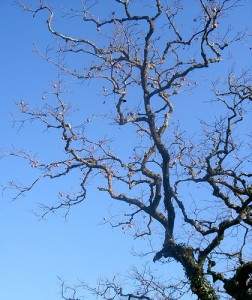In Florida, everyone wants to grow citrus. In Georgia, folks just gotta have peaches. Further north, apples are king.
When I wrote a blog post at my own site on how to identify citrus greening some months back, it picked up some decent traffic. You may have never heard of “citrus greening,” but in citrus growing regions, it’s a very big deal. It may mean no orange juice in a few years. Florida has monocultured citrus for a long time and the practice is catching up to us. There have been other scares with different crops over the years.
All that to say, there are benefits to growing less-common fruit trees. If you’re in an area that has a lot of a particular type of fruit, chances are you have a lot of that particular fruit’s pests. It may make sense climatically to grow a particular fruit – there’s a reason these monoculture orchards are located where they are – but it may be hard to pull off without a lot of extra work… or spraying… or being inventive with your food forest planning.
That’s why I regularly seek out trees and plants that are lesser known. Though native persimmons are familiar to many of us, they’re a finicky thing. I love the trees and the fruit, but you have to catch them at a perfect level of ripeness or they’ll turn your mouth to cotton and give you an unpleasantly bitter experience.
Japanese persimmons aren’t like that. Well… let me step back: the “non-astringent” varieties of Japanese persimmon aren’t like that. If you want to delve deeper into the world of persimmons, learning to love the astringent varieties (both dmoestic and Asian) wouldn’t be a bad idea… but for persimmon newbies, I would recommend the classic “Fuyu” variety. The Fuyu is a honey-sweet persimmon that stores amazingly well, tastes excellent and can be eaten before it’s completely ripe, unlike the American persimmons you may have tried as a kid.
How To Grow Persimmons
 There are Japanese persimmon cultivars that will grow from USDA Zone 6 and warmer. If you fall into that geographical sweet spot, you’re in luck. (Check and seehere. I don’t trust the revised map since it no longer reflects real conditions in my area, leading me to believe its creation was influenced by GloboWarmThink).
There are Japanese persimmon cultivars that will grow from USDA Zone 6 and warmer. If you fall into that geographical sweet spot, you’re in luck. (Check and seehere. I don’t trust the revised map since it no longer reflects real conditions in my area, leading me to believe its creation was influenced by GloboWarmThink).
Persimmon trees take a little while to really get going, so you’ll have to wait a few years for your harvest. My three trees were planted two years ago and two of them set their first fruit this spring, only to drop it in summer. I already knew this was normal for young persimmons. It’s sad to wait, but it’s better for them to put their energy into growing skyward than it is into fruiting. And I do have plenty of encouragement to be patient: around the corner from me there’s a man with multiple trees that are over a decade old… they produce baskets of fruit every fall. Good things come to those who wait.
Pests aren’t a big deal on persimmons. You may have to pick off the occasional bagworm colony but rarely is any serious damage done. These trees are tough. Your biggest problems are likely to be deer, if you suffer that particular scourge in your area. Shoot them, then serve the venison in a persimmon sauce.
I feed my young trees with a combination of different things. Sometimes I toss 10-10-10 around them during the growing season. Other times I give them chicken manure, urine, compost or a nutrient-rich mulch of chopped Tithonia diversifolia, Senna alataand whatever weeds are growing nearby. They seem to like mulching – and speaking of mulching, make sure your young trees don’t have to compete with grass for nutrients. Hoe around them or keep a good ring of mulch going to at least 2-3′ from the trunks. That will greatly increase their rate of growth and overall vitality. Grass is hungry stuff and it will outcompete the tree’s roots.
What To Do With Persimmons
Other than eating them fresh, persimmons are a great candidate for most of the home-preserving arts. Dried, they taste sweeter than sugar and can be added to trail mixes, muffins, oatmeal or whatever your heart fancies. Canning is another good way to go. Persimmon jam is easy and delicious. I don’t use a recipe when I make jams… I just boil the fruit down until it gels. If it doesn’t I throw in pectin. I know… I’m never going to make The Splendid Table that way. But I don’t care.
One final favorite: you can turn persimmons into delicious alcohol. A friend of mine tried to make wine from them and got something weird and slimy, then found that his weird and slimy beverage could be magically converted into an inspiring (and almost infinitely storable) beverage with the use of a pressure cooker, a coil of copper and a little American ingenuity.
Whatever you do with your persimmons… you won’t regret growing them. The trees are beautiful, the pests are minimal and the harvest is scrumptious.
SOURCE : theprepperproject.com
About David Goodman
David Goodman is an amateur scientist and hard-core gardener who has grown his own food since 1984. At age five, he sprouted a bean in a Dixie cup of soil and caught the gardening bug. Soon after, his dad built an 8’ by 8’ plot for him and David hasn’t stopped growing since. David writes a regular column for Natural Awakenings magazine in North Central Florida, posts on the Mother Earth News blog, owns a nursery of hard-to-find tropical edibles (www.floridafoodforests.com) and grows roughly 1.5 zillion plants on his one-acre homestead. In mid-2012, he launched www.floridasurvivalgardening.com as a place to share his ongoing experiments with tropical and temperate crops. He currently has over 20 intensive beds, multiple field plots, over 100 fruit trees, 50 chickens and ducks, and a series of ongoing experiments in-progress – all of which bring him closer each day to complete food security. David is a Christian, a husband, a father of six, a cigar-smoker and an unrepentant economics junkie. You can also read his articles on his site: Florida Survival Gardening


